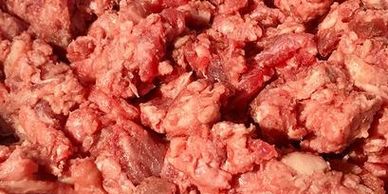Due to the rapidly changing market please call for current prices.
Ground Pet Food
Beef Organ Blend
Beef Organ Blend
Beef Organ Blend

Beef (with bone), beef hearts, beef liver, and beef kidney. (2# bag)
Lamb & Pork Mix
Beef Organ Blend
Beef Organ Blend
Lamb hearts, pork hearts, lamb lung with trachea, lamb meat, pork meat, pork liver, lamb kidneys, pork kidneys, bone meal. (2# bag)
Chicken
Beef Organ Blend
Chicken

Coarsely ground chicken necks and backs. (2# bag)
Turkey
Beef Green Tripe
Chicken
Coarse ground turkey necks. (2# bag)
Beef Green Tripe
Beef Green Tripe
Beef Green Tripe

This stinky concoction is a pet favorite! Tripe is the stomach lining of the beef. It is low in fat and high in probiotics. We rinse it in water to (help) with the smell. Tripe should be handled with care. Product should not be handled by children. 14# cases (2# packages)
40# cases (2# packages)
Unground
Chicken & Turkey
Parts and pieces of poultry for your pooch or purrer
Chicken Necks
Whole, unground necks (40# case)
Whole case- $.99/#
Small portions- $1.29/#
Chicken Backs
Whole, unground backs (40# case)
Whole case- $.99/#
Small portions- $1.29/#
Chicken Feet
Great as dental chews and known to help with mobility and joint pain. Sold in a 10# bag.
Turkey Necks
Whole, unground necks (30-40# case)
Whole case- $1.39/#
Small portions- $1.59/#
Beef & Lamb
Red Meats Unite
Beef Knuckle Bones
Beef knuckle bones rich in gelatin. Sold by the bag (4-5# bag)
Beef Marrow Bones
Beef marrow bones, great for teeth and high in calcium!
Beef Oxtail
Great for oxtail soup for humans, but dogs also love them for a meaty treat!
Lamb Neck Bones
Meaty lamb neck bones
Products subject to availability- prices listed per pound unless noted otherwise
Frequently Asked Questions
Do I need to cook it?
What precautions can I take to prevent my pet from getting sick?
Will raw food make my animal sick?
Animal needs vary greatly, and you should consult your veterinarian or pet nutritionist for your specific animal. We modeled our pet food after Dr. Billinghurst's BARF (Biologically Appropriately Raw Food) diet. While some pets require cooked food, most of our pet food is fed in the raw state.
Will raw food make my animal sick?
What precautions can I take to prevent my pet from getting sick?
Will raw food make my animal sick?
Biologically, animals are able to handle pathogens and bacteria much better than humans due to their elevated stomach acids and short digestive tracts. Animals can have varying allergies and intolerances, so it is best to watch your pet closely when trying new diets. It is also worth noting that the enzymes required to digest cooked and raw foods are different. Mixing cooked and raw foods, ie. kibble and raw blend, may cause gastrointestinal upset.
What precautions can I take to prevent my pet from getting sick?
What precautions can I take to prevent my pet from getting sick?
What precautions can I take to prevent my household from getting sick?
Store foods frozen until use, and use all defrosted foods within 3 days of defrosting. Remove any uneaten portions within a half hour of feeding. Be sure to wash your pet's food bowl in between each meal. It is best to avoid mixing raw and cooked foods, to prevent gas and diarrhea. Presently it is believed that dogs should not consume bones cooked over a short period of time. Cooked bones tend to splinter when chewed on and may cause blockages- or other problems.
What precautions can I take to prevent my household from getting sick?
What precautions can I take to prevent my household from getting sick?
What precautions can I take to prevent my household from getting sick?
When handling all pet foods it is important to wash your hands and all surfaces and utensils to prevent cross contamination. When handling green tripe it is especially important to be cautious, as green tripe is inedible and contains an abundance of bacteria. It is very important to not let those with compromised immune systems (including the elderly and children) handle tripe. Tripe is a source of e.Coli O157: H7 STEC and pet-parents should be aware and cautious of this when handling and feeding. Although e.Coli can be a scary word when used in terms of our fur family, animals are not affected by this form of e.Coli.
Do I need to add anything or is this food nutritionally complete?
What precautions can I take to prevent my household from getting sick?
Do I need to add anything or is this food nutritionally complete?
How much should I feed?
What precautions can I take to prevent my household from getting sick?
Do I need to add anything or is this food nutritionally complete?
Follow the following guidelines for feeding as suggested by Dr. B:
*Healthy adult dogs, not exercising: feed approx. 2-3% of bodyweight daily, fed twice/day
-Dogs on a weight loss program: reduce feeding level by up to 20-30%
*Young adult dogs which exercise daily (not excessively): feed approx. 3-4% of bodyweight, divided into 2 meals.
*Working, racing or highly active dogs: feed approx. 3-6% of bodyweight daily. Food with a higher fat content to increase the energy supply. Reduce feeding level when not active or working.
* Small to medium breed puppies: feed 3-6% of bodyweight daily, divided into 3-4 small meals. Reduce as they reach adulthood.
* Large to giant breed puppies: feed 2-4% of bodyweight per day, divided into 3-4 meals
*Pregnant females: feed approx. 2-4% of bodyweight for the first ⅔ of pregnancy, divided into 2 meals. For the last ⅓ of pregnancy, increase to 3-5% of bodyweight daily, divided into 2-4 meals.
-Lactating females: feed approx. 3-6% of bodyweight daily, free choice, depending on litter size.
Raw Resources
1/3